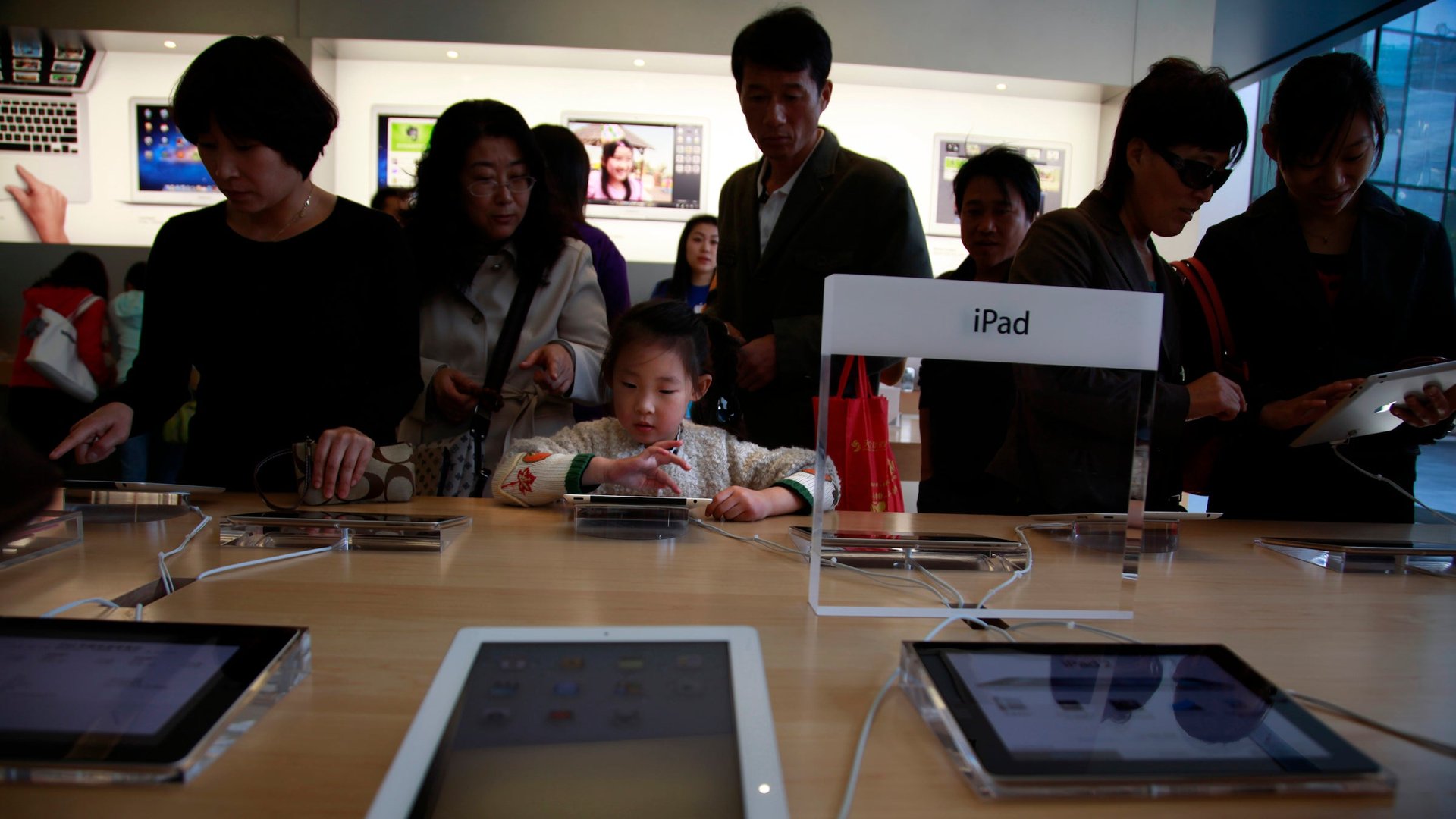Are the Chinese ready for Apple’s plan to turn them into debtaholics?
Apple intends to make China its largest market (it’s currently the second-largest). And to get there, it is going to give Chinese consumers a helping hand. It’s launching a credit facility to let people buying any Apple product over 300 yuan ($48) pay in monthly installments. A plan of 12 months or less is interest-free; longer plans will carry a surcharge of up to 8.5%. The one caveat is that buyers must use a card from China Merchants Bank, one of China’s most retail-friendly banks.


Apple intends to make China its largest market (it’s currently the second-largest). And to get there, it is going to give Chinese consumers a helping hand. It’s launching a credit facility to let people buying any Apple product over 300 yuan ($48) pay in monthly installments. A plan of 12 months or less is interest-free; longer plans will carry a surcharge of up to 8.5%. The one caveat is that buyers must use a card from China Merchants Bank, one of China’s most retail-friendly banks.
The move is intended to help Apple win market share from local companies making cheaper smartphones. The company was in sixth place in the Chinese smartphone market in the third quarter of last year, but it has never made cheap phones (though there are reports it may start doing so soon). Its payment plans will at least make them seem cheaper. Mark Natkin, the founder of Marbridge Consulting, a Beijing telecom research firm, says, ”It’s a way for Apple to make the product more accessible to a much larger user base—the same reason any company gets into China in the first place–while allowing its product to remain a luxury product.”
Apple offers financing in the US, Brazil, Singapore and several other countries, but payment habits and debt culture vary wildly. In America, installment plans are common for expensive purchases. In Brazil, customers use them for everything from groceries to plastic surgery. In Russia, where there is a general distrust of online and credit card transactions, cash-on-delivery is still preferred.
And in China, although the use of credit cards has been growing explosively, from 10% of consumer-goods purchases in 2000 to 40% in 2011, consumers have historically recoiled from debt. Christian Giannini, a American banker who spent nearly a decade as a director of ChinaVest, one of the first Western merchant banks to operate in China, says he never encountered installment plans in his years living there (he left in 2009). Giannini said the Chinese attitude toward money does not favor debt. “The Chinese thinking is, if you can’t afford it by paying for it right away, what makes you think you can pay for it over a period of 12 or 18 months? This is the history of China. Cash in hand, cash is king.”
However, the success of subsidized iPhone contracts that one Chinese telecom offers might suggest that habits are shifting. Since 2011, China Unicom has offered discounted or free (link in Chinese) iPhones to subscribers of two- or three-year contracts. Much the way Verizon or AT&T do in the US, Unicom recoups the device cost over time through the contracted monthly payments. Those in-all-but-name installment plans, which have ranged from 66 yuan ($10) to 386 yuan ($62), have done well enough with Chinese consumers that the front-loaded subsidy costs ended up hurting Unicom’s bottom line.
But Apple products are not considered ordinary purchases in China, where top brands carry tremendous status value, as Marbridge Consulting’s Natkin points out. “There was a guy here who donated a kidney to get an iPhone,” he says. “I don’t disagree that Chinese people are savers and less likely to take on debt, but if you’ve got someone donating a kidney to scare up the cash he needs for an iPhone, you can convince him to take on a little debt.”
Giannini, however, cautions that Apple’s venture into credit could have repercussions for the state of lower-class Chinese savings:
“For the Chinese worker, the cost of an iPhone is expensive, about a month and a half of wages. And 8.5% interest is a lot of money. The last thing China needs is tier three workers thinking, ‘I can afford this in 24 months, who cares if I can’t pay for it right now?’ Is it appropriate for Apple to be making these decisions for consumers?”
The decisions are ultimately the consumers’ to make. But it’s true that people who aren’t used to credit often don’t handle it very well at first. After all, Americans unschooled in the proper use of debt played their own part fueling the US housing bubble that brought the world economy to its knees.